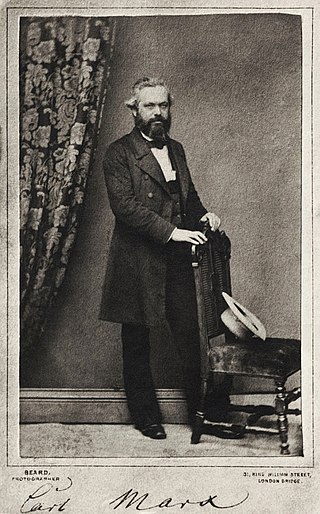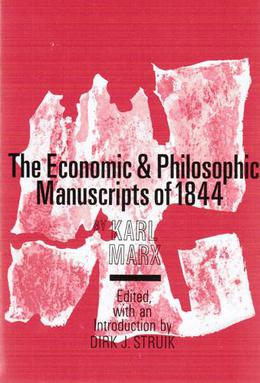
In Marxist philosophy, the term commodity fetishism describes the economic relationships of production and exchange as being social relationships that exist among things and not as relationships that exist among people. As a form of reification, commodity fetishism presents economic value as inherent to the commodities, and not as arising from the workforce, from the human relations that produced the commodity, the goods and the services.
Productive forces, productive powers, or forces of production is a central idea in Marxism and historical materialism.

Economic determinism is a socioeconomic theory that economic relationships are the foundation upon which all other societal and political arrangements in society are based. The theory stresses that societies are divided into competing economic classes whose relative political power is determined by the nature of the economic system.

Marxist aesthetics is a theory of aesthetics based on, or derived from, the theories of Karl Marx. It involves a dialectical and materialist, or dialectical materialist, approach to the application of Marxism to the cultural sphere, specifically areas related to taste such as art, beauty, and so forth. Marxists believe that economic and social conditions, and especially the class relations that derive from them, affect every aspect of an individual's life, from religious beliefs to legal systems to cultural frameworks. From one classic Marxist point of view, the role of art is not only to represent such conditions truthfully, but also to seek to improve them ; however, this is a contentious interpretation of the limited but significant writing by Marx and Engels on art and especially on aesthetics. For instance, Nikolay Chernyshevsky, who greatly influenced the art of the early Soviet Union, followed the secular humanism of Ludwig Feuerbach more than he followed Marx.
István Mészáros was a Hungarian Marxist philosopher. Described as "one of the foremost political philosophers of the late twentieth and early twenty-first centuries" by Monthly Review, Mészáros wrote mainly about the possibility of a transition from capitalism to socialism. His magnum opus, Beyond Capital: Toward a Theory of Transition (1995), was concerned not only with this theme but provided a conceptual distinction between capitalism and capital, and an analysis of the current capitalist society and its "structural crisis". He was interested in the critique of the so-called "bourgeois ideology", including the idea of "there is no alternative", and he also elaborated analysis on the failures of "real socialism".

Marxist humanism is an international body of thought and political action rooted in an interpretation of the works of Karl Marx. It is an investigation into "what human nature consists of and what sort of society would be most conducive to human thriving" from a critical perspective rooted in Marxist philosophy. Marxist humanists argue that Marx himself was concerned with investigating similar questions.

In Marxism, reification is the process by which social relations are perceived as inherent attributes of the people involved in them, or attributes of some product of the relation, such as a traded commodity. This concept specifies the dialectical relationship between social existence and social consciousness – that is, between objective social relations and the subjective apprehension of those relations – in a society dominated by commodity production.
György Lukács was a Hungarian Marxist philosopher and literary critic.

The correct place of Karl Marx's early writings within his system as a whole has been a matter of great controversy. Some believe there is a break in Marx's development that divides his thought into two periods: the "Young Marx" is said to be a thinker who deals with the problem of alienation, while the "Mature Marx" is said to aspire to a scientific socialism.

In Marxism, a theoretician is an individual who observes and writes about the condition or dynamics of society, history, or economics, making use of the main principles of Marxian socialism in the analysis.

The Economic and Philosophic Manuscripts of 1844, also referred to as the Paris Manuscripts or as the 1844 Manuscripts, are a series of notes written between April and August 1844 by Karl Marx, published posthumously in 1932.

Marxist philosophy or Marxist theory are works in philosophy that are strongly influenced by Karl Marx's materialist approach to theory, or works written by Marxists. Marxist philosophy may be broadly divided into Western Marxism, which drew from various sources, and the official philosophy in the Soviet Union, which enforced a rigid reading of Marx called dialectical materialism, in particular during the 1930s. Marxist philosophy is not a strictly defined sub-field of philosophy, because the diverse influence of Marxist theory has extended into fields as varied as aesthetics, ethics, ontology, epistemology, theoretical psychology and philosophy of science, as well as its obvious influence on political philosophy and the philosophy of history. The key characteristics of Marxism in philosophy are its materialism and its commitment to political practice as the end goal of all thought. The theory is also about the struggles of the proletariat and their reprimand of the bourgeoisie.

György Lukács was a Hungarian Marxist philosopher, literary historian, critic, and aesthetician. He was one of the founders of Western Marxism, an interpretive tradition that departed from the Marxist ideological orthodoxy of the Soviet Union. He developed the theory of reification, and contributed to Marxist theory with developments of Karl Marx's theory of class consciousness. He was also a philosopher of Leninism. He ideologically developed and organised Lenin's pragmatic revolutionary practices into the formal philosophy of vanguard-party revolution.

In Marxist theory, false consciousness is a term describing the ways in which material, ideological, and institutional processes are said to mislead members of the proletariat and other class actors within capitalist societies, concealing the exploitation intrinsic to the social relations between classes. Friedrich Engels (1820–1895) used the term "false consciousness" in an 1893 letter to Franz Mehring to address the scenario where a subordinate class willfully embodies the ideology of the ruling class. Engels dubs this consciousness "false" because the class is asserting itself towards goals that do not benefit it.

Dialectical materialism is a philosophy of science, history, and nature developed in Europe and based on the writings of Karl Marx and Friedrich Engels. Marxist dialectics, as a materialist philosophy, emphasizes the importance of real-world conditions and the presence of contradictions within things, in relation to but not limited to class, labor, and socioeconomic interactions. This is in contrast to the idealist Hegelian dialectic, which emphasizes the observation that contradictions in material phenomena could be resolved by analyzing them and synthesizing a solution whilst retaining their essence. Marx supposed that the most effective solution to the problems caused by said contradictory phenomena was to address and rearrange the systems of social organization at the root of the problems.

Western Marxism is a current of Marxist theory that arose from Western and Central Europe in the aftermath of the 1917 October Revolution in Russia and the ascent of Leninism. The term denotes a loose collection of theorists who advanced an interpretation of Marxism distinct from both classical and Orthodox Marxism and the Marxism-Leninism of the Soviet Union.

History and Class Consciousness: Studies in Marxist Dialectics is a 1923 book by the Hungarian philosopher György Lukács, in which the author re-emphasizes the philosopher Georg Wilhelm Friedrich Hegel's influence on the philosopher Karl Marx, analyzes the concept of "class consciousness," and attempts a philosophical justification of Bolshevism.

Various Marxist authors have focused on Marx's method of analysis and presentation as key factors both in understanding the range and incisiveness of Karl Marx's writing in general, his critique of political economy, as well as Grundrisse andDas Kapital in particular. One of the clearest and most instructive examples of this is his discussion of the value-form, which acts as a primary guide or key to understanding the logical argument as it develops throughout the volumes of Das Kapital.

The following outline is provided as an overview of and topical guide to Marxism:
Several economic theories of the first half of the 19th century were influenced by Romanticism, most notably those developed by Adam Müller, Simonde de Sismondi, Johann Gottlieb Fichte and Thomas Carlyle. Michael Löwy and Robert Sayre first formulated their thesis about Romanticism as an anti-capitalist and anti-modernist worldview in a 1984 article called "Figures of Romantic Anti-capitalism". Romantic anti-capitalism was a wide spectrum of opposition to capitalism, ultimately tracing its roots back to the Romantic movement of the early 19th century, but acquiring a new impetus in the latter part of the 19th century.